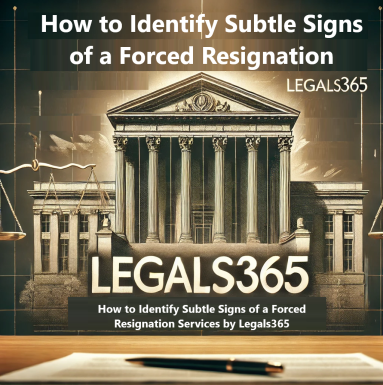
How to Identify Subtle Signs of a Forced Resignation
Resigning from a job is typically a personal decision, but what if you are being subtly pushed out by your employer? Forced resignation is a growing concern, where employees are pressured into leaving without an outright dismissal. While some cases are overt, many employers use subtle tactics that can be hard to identify. If you suspect that your employer is coercing you into resigning, you need to recognize the warning signs and take appropriate action.
At Legals365, we help employees understand their rights and navigate the legal complexities of wrongful termination and forced resignations. This article will help you identify the subtle signs of a forced resignation, understand your legal options, and learn how Legals365 can assist you in protecting your career and seeking justice.
Signs That You May Be Facing a Forced Resignation
1. Sudden Negative Performance Reviews
One of the first signs of a forced resignation is an unexpected drop in your performance ratings. If you previously received positive feedback but suddenly start receiving harsh criticism, it may be a strategic attempt to justify your removal.
What to Watch For:
Negative performance reviews without proper documentation.
Unrealistic expectations or goals that are impossible to meet.
Sudden claims of incompetence despite prior positive feedback.
2. Exclusion from Important Projects and Meetings
If you notice that you are being sidelined from major projects, meetings, or decision-making processes, your employer may be setting the stage for your exit.
What to Watch For:
Being removed from key team discussions.
Sudden changes in reporting structures.
Colleagues being assigned your responsibilities.
3. Increased Micromanagement and Unreasonable Demands
Employers looking to push someone out often increase micromanagement and excessive scrutiny in an attempt to frustrate the employee into resigning.
What to Watch For:
Unnecessary monitoring of your tasks and work hours.
Unachievable deadlines and workload increases.
Frequent policy changes that impact only you.
4. Sudden Change in Workplace Treatment
A forced resignation can sometimes manifest in a hostile work environment, where an employee is made to feel unwanted or undervalued.
What to Watch For:
Being ignored or isolated by managers and colleagues.
Being assigned menial tasks below your skill level.
Unexplained salary deductions or removal of workplace perks.
5. Pressure to Accept a Voluntary Exit Package
Some employers disguise a forced resignation as a voluntary separation package, offering financial incentives to leave.
What to Watch For:
HR insisting that taking the package is in your best interest.
Statements like “You should consider resigning before things get worse.”
Pressure to sign documents on short notice.
Legal Implications of a Forced Resignation
A forced resignation is legally recognized as constructive dismissal, which means that the resignation was not voluntary but rather a result of employer coercion. In many cases, this can be challenged under employment laws.
Legal Protections for Employees in India
The Industrial Disputes Act, 1947 – Protects employees from unfair dismissals and forced resignations.
The Indian Contract Act, 1872 – Prevents employers from enforcing unfair employment agreements.
The Shops and Establishments Act – Ensures fair treatment of employees.
The Maternity Benefit Act, 1961 – Protects women from forced resignations due to pregnancy or family obligations.
What to Do If You Suspect a Forced Resignation
1. Document Everything
Keep detailed records of all emails, performance reviews, messages, and meeting notes that indicate pressure to resign.
2. Do Not Resign Immediately
If you resign without understanding your rights, you may lose the opportunity to file a wrongful termination claim. Instead:
Request a formal reason for the pressure to resign.
Ask for written documentation of negative performance reviews.
Consult a legal expert before signing anything.
3. Seek Legal Assistance
At Legals365, we provide specialized legal services to help employees:
Challenge constructive dismissal cases.
Negotiate severance packages.
File wrongful termination claims.
Protect their career reputation and financial security.
4. File a Formal Complaint
If your employer continues to pressure you into resigning, you can file complaints with:
The Labor Commissioner’s Office.
The Industrial Tribunal or Labor Court.
The Human Rights Commission, if discrimination or harassment is involved.
How Legals365 Can Help You
At Legals365, we offer:
Legal Consultation: Helping you understand your legal rights.
Employment Law Representation: Assisting with claims and negotiations.
Severance Agreement Review: Ensuring fair compensation for resignations.
Litigation Support: Filing legal actions if necessary.
We are committed to protecting employees from workplace exploitation and forced resignations.
Identifying the subtle signs of a forced resignation is crucial to protecting your rights and career. If you notice any of these red flags, take action immediately by documenting incidents, seeking legal advice, and exploring your options.
If you need expert guidance, contact Legals365 today for professional legal assistance to fight against wrongful termination and forced resignations.
#ForcedResignation #EmployeeRights #WrongfulTermination #HRDisputes #WorkplaceCoercion #EmploymentLaw #LaborLaw #WorkplaceJustice #Legals365 #SeveranceNegotiation #EmploymentDisputes #HRPressure #WorkplaceHarassment #LegalAssistance #KnowYourRights
Legals365 offers comprehensive, expert support for all yourHow to Identify Subtle Signs of a Forced Resignation needs. Our experienced team of legal professionals provides tailored guidance to help you navigate the complexities of How to Identify Subtle Signs of a Forced Resignation cases with confidence. Whether you need assistance with documentation, court representation, or strategic planning, Legals365's How to Identify Subtle Signs of a Forced Resignation services are designed to protect your interests and achieve the best outcomes. We handle every How to Identify Subtle Signs of a Forced Resignation case with professionalism and dedication, ensuring that you receive personalized, client-focused support. Trust Legals365 for all your How to Identify Subtle Signs of a Forced Resignation needs, as we work tirelessly to deliver results that make a difference.
Contact Us Today:
📱 Email: advocates@legals365.com
📞 Phone: +91 9625972356
Choose Legals365 for trusted, client-focused legal support in How to Identify Subtle Signs of a Forced Resignation and beyond. Feel free to ask any question for free or explore answers to questions asked by live users.


